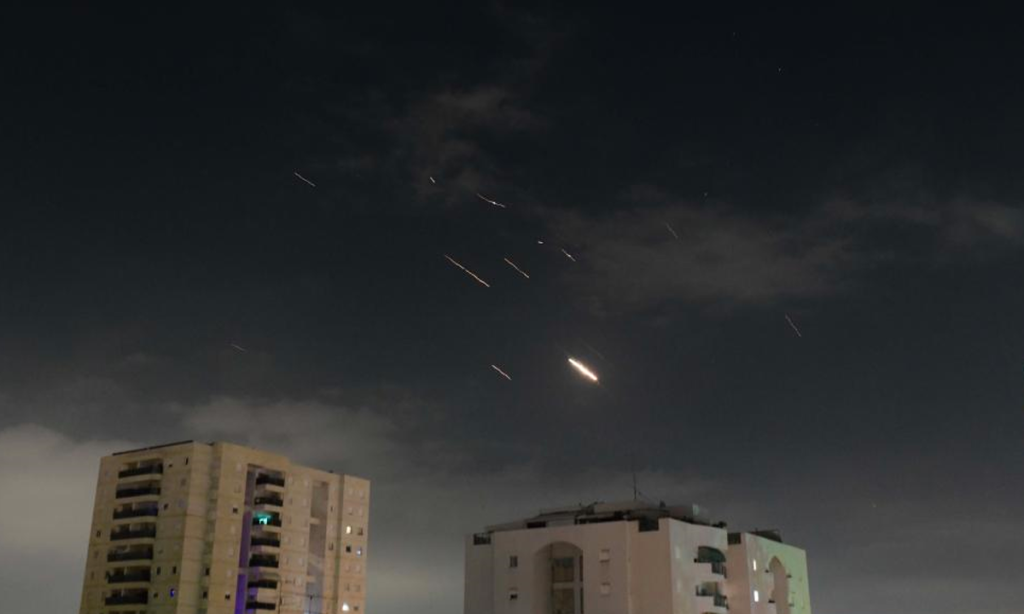US eyes on new sanctions on Iran, urged to be responsible in Mideast affairs

The US-led West is once again eyeing a series of new sanctions against Iran, as Israel's war cabinet has put off a third meeting to decide on a response to Iran's attack. However, analysts warned that more sanctions are unlikely to stop Iran or an escalation of the tensions in the Middle East, but could instead trigger more aggressive decisions from Iran. The US should take responsibility and use its influence to prevent Israel from escalating the conflict, they said.
On Tuesday local time, the White House announced that it will impose new sanctions targeting Iran, including its missile and drone program as well as new sanctions against entities supporting the Islamic Revolutionary Guard Corps (IRGC) and Iran's Defense Ministry, and will work to "further erode the effectiveness of Iran's missile and UAV capabilities."
With Washington saying that it anticipates that "its allies and partners will soon be following," the UK's Prime Minister Rishi Sunak said that he was working with G7 partners on further sanctions against Tehran, The Guardian reported.
Nonetheless, experts told the Global Times on Wednesday that new sanctions are unlikely to have a significant impact on Iran, as the country has experienced long-term sanctions and has essentially become accustomed to striving under such sanctions.
"Economic and technological sanctions will not have a major effect on Iran, at most it will only create some pressure in terms of public opinion," Zhu Yongbiao, executive director of the Research Center for the Belt and Road at Lanzhou University, told the Global Times on Wednesday.
On the other hand, sanctions will only worsen the relationship between the US and Iran, and may even lead some decision-makers in Iran to believe that they should launch more aggressive attacks, warned Lü Xiang, a research fellow at the Chinese Academy of Social Sciences.
If Iran and Israel were to engage in serious attacks, it would have irreversible consequences for the entire region, likely on a scale not seen since the earlier Middle East wars, and would have a very negative impact on global energy supply, said Lü, who described the scenario as "unimaginable."
Lü believes that the key to this issue still lies in the US, which is the biggest influencer in the Middle East.
"Now that we know the US always has a special relationship with Israel, it should take the responsibility and use its influence to suppress Israel's warlike impulses," Lü said. "If the US instead encourages Israel, the situation will be very difficult to handle."
The current US government's Middle East policy is the most chaotic, on which the Biden administration needs to reflect, Lü said. He noted that its overall foreign policy is also very chaotic, with issues involving Russia, Iran and China all mixed up without a clear boundary or clue.
Zhu described the US' attitude toward Middle East issues as "duplicity." "On one hand, it tries to portray itself as a maintainer of order in the Middle East. On the other hand, it is deeply tied to Israel, heavily favoring Israel, with a stark contrast in its rhetoric," he said.
Zhu noted that Israel is adopting a comprehensive strategy against Iran, counterattacking economically, politically, and in terms of public opinion, including its recent statements and calls for Western countries to sanction Iran, which are both a threat and a form of psychological warfare.
On the contrary, observers pointed out that Iran is currently adopting a restrained attitude, as its latest attacks against Israel caused no deaths and little damage.
From the current situation, it appears that there are communication channels between Iran and Israel, Lü said. "If the international community also exerts the right influence, the entire conflict still can potentially be controlled within manageable limits."
Zhu believes that while the likelihood of military conflict between Israel and Iran is increasing, the possibility of it catalyzing a large-scale war in the Middle East is relatively low.
"The basic ecology of this region has not fundamentally changed - The US does not want to be dragged into another Middle East war, and Arab countries also do not want to see another large-scale war," he said. "Due to the lack of willingness from all parties, the likelihood of a full-scale war breaking out in the short term is very low."